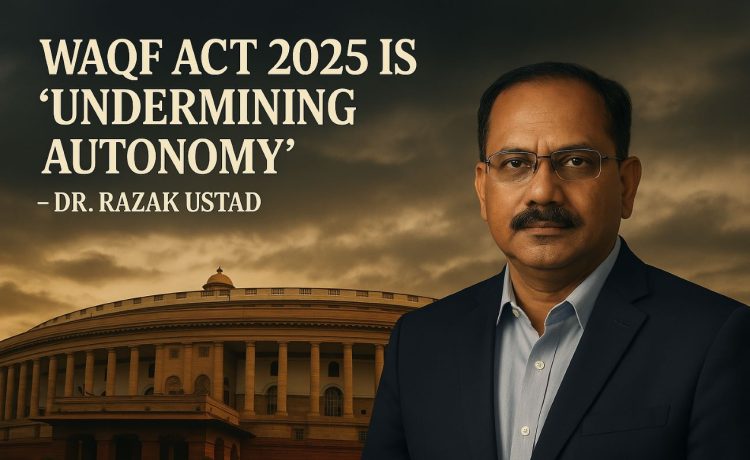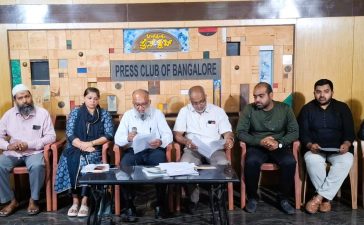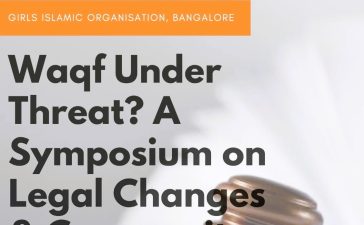Debate Over Wakf Amendment Bill 2025 Sparks Confusion and Concern Across India
The proposed legislation draws sharp reactions from both supporters and critics, with concerns about minority rights, religious autonomy, and administrative overreach.
By Dr. Razak Ustad, Raichur
The proposed Wakf Amendment Bill, 2025, has reignited a national debate, creating confusion among the public and deepening concerns within the Muslim community. While proponents argue that the bill will help reclaim encroached Wakf properties and benefit poor and marginalized Muslims, critics fear it may weaken the autonomy of Wakf institutions and infringe upon constitutional rights.
A Divisive Proposal
 The central government’s introduction of the Wakf Amendment Bill, 2025, has polarized public opinion. Supporters of the bill, primarily from the ruling BJP and its allies, claim it will aid poor Muslims, widows, and orphans by streamlining Wakf property management. However, critics warn that the bill is riddled with ambiguities and could lead to the dispossession of legitimate Wakf assets.
The central government’s introduction of the Wakf Amendment Bill, 2025, has polarized public opinion. Supporters of the bill, primarily from the ruling BJP and its allies, claim it will aid poor Muslims, widows, and orphans by streamlining Wakf property management. However, critics warn that the bill is riddled with ambiguities and could lead to the dispossession of legitimate Wakf assets.
“There is a growing perception that this bill could be a backdoor attempt to take control of religious institutions under the guise of reform,” said one community leader familiar with the developments.
What Is Wakf?
Wakf refers to property donated by individuals for religious or charitable purposes in Islam. These assets—mosques, dargahs, graveyards, and other endowments—are not government grants, but voluntarily contributed by citizens. The Wakf Board is tasked with managing these properties and safeguarding their religious purpose.
Even today, thousands of Muslims continue to endow their private properties as Wakf annually. “One may build a mosque and register it with the Wakf Board, while another may donate land in the name of a revered saint,” noted Dr. Ustad. “This is a dynamic, living tradition that only grows with time.”
Allegations of Misrepresentation
A key point of contention is the claim that the Wakf Board has been indiscriminately declaring private lands as Wakf properties. This, critics argue, is a deliberate misinformation campaign to discredit the institution. “It is patently false that the Board can arbitrarily seize any land,” said Ustad, citing that the process of property registration is legally regulated.
Constitutional Concerns
The proposed bill includes a clause stating that any individual wishing to declare property as Wakf must have practiced Islam for at least five years. Critics argue this violates Articles 14 and 15 of the Indian Constitution, which guarantee equality before the law and prohibit discrimination on religious grounds.
“There is no such requirement in laws governing donations in other religions. This selective rule targets one community and is unconstitutional,” said a legal expert familiar with the legislation.
Disputes and Judicial Overlap
The bill introduces confusion by stipulating that any disputes regarding Wakf properties must be settled in Wakf Tribunals. Although the government claims Tribunal decisions are final, this contradicts existing legal norms where such rulings can be challenged in High Courts.
“There are thousands of Wakf Tribunal rulings currently under judicial review. To say they are unchallengeable is not just misleading—it’s laughable,” Ustad commented.
Inclusion of Non-Muslims in Religious Administration
Another contentious provision allows the appointment of up to seven non-Muslims out of eleven total Wakf Board members, whereas only four must be Muslims. Critics argue that this violates Articles 25 and 26 of the Constitution, which protect the rights of religious communities to manage their own affairs.
“The idea that a religious institution should be run by people outside that religion is absurd and dangerous,” said a former Wakf Board member.
Erosion of Board Powers
The bill removes several powers previously granted to Wakf Boards under the 1995 and 2013 Acts. For instance:
-
Section 40, which allowed the Board to declare properties as Wakf based on usage, has been revoked.
-
The Board no longer has the authority to frame administrative rules for its institutions.
-
Encroached Wakf properties cannot be reclaimed if the encroachment exceeds 12 years—effectively granting immunity to long-term encroachers.
“This weakens the Board at a time when it should be empowered,” said Ustad. “It’s like tying their hands while asking them to protect sacred land.”
Missed Opportunities
While the government claims the bill is intended to uplift the poor, critics say it lacks concrete provisions for community welfare. “There is no clause mandating Wakf institutions to invest in schools, hospitals, or social services,” Ustad noted.
Instead, he argues, the law could have required high-income Wakf institutions to allocate a percentage of their annual income toward local welfare. “That would have shown real intent. What we have now is mere optics.”
Misleading Narratives in Parliament
During a recent parliamentary session, the Minister for Minority Affairs cited a case where a Wakf Board allegedly claimed an entire village in Tamil Nadu. However, MP A. Raja countered this by stating that when the Joint Parliamentary Committee visited the region, local officials, including the District Collector and Revenue Secretary, denied such a claim had ever been made.
“No BJP member responded to this contradiction in the House,” Ustad pointed out. “That silence speaks volumes.”
A Political Distraction?
Overall, Ustad asserts that the Wakf Amendment Bill, 2025, may be an attempt by the ruling party to present the Wakf issue as a national crisis that demands urgent attention. “This is being projected as if fixing Wakf will somehow fix the entire country,” he said. “But the bill as it stands is a disservice to democratic values and religious freedoms.”
Implications Ahead
As debate intensifies, the Wakf Amendment Bill, 2025, remains under scrutiny by civil rights groups, legal experts, and religious leaders. Its passage in its current form could set a precedent with far-reaching implications for minority rights and the secular fabric of India.
Whether the government will revisit and revise the bill in light of public concern remains to be seen. But one thing is clear: the conversation around Wakf is no longer just about land—it’s about identity, rights, and the soul of a pluralistic nation.
🔹 BACKGROUND & CONTEXT
-
What is Wakf?
Wakf refers to properties donated by Muslims for religious or charitable purposes—like mosques, dargahs, graveyards. These are not government properties but community-owned assets overseen by Wakf Boards. -
Why is the 2025 Amendment controversial?
The proposed changes allegedly limit the powers of Wakf Boards, allow inclusion of non-Muslims in religious administrative roles, and could obstruct the recovery of encroached Wakf land. Critics say it undermines religious freedom and violates constitutional safeguards. -
Who supports it?
The BJP and its allies claim the bill helps the poor, especially widows and orphans, and aims to improve transparency in Wakf institutions. -
Who opposes it?
Legal experts, minority leaders, and civil rights groups argue the bill weakens religious autonomy, creates legal hurdles, and ignores community welfare.
🔹 QUOTES
🗣️ “This bill is not a reform—it’s a retraction. It takes away powers instead of strengthening the Wakf Board.”
— Dr. Razak Ustad, Columnist and Community Analyst
🗣️ “You cannot appoint outsiders to govern religious institutions and call it secularism. It’s a direct violation of Article 26.”
— Former Wakf Board Member, anonymous
🗣️ “They say it will help the poor. But where are the clauses about healthcare, education, or welfare? There are none.”
— Community Advocate, Bengaluru
🗣️ “There’s deliberate misinformation that Wakf Boards randomly claim land. That narrative is politically motivated.”
— Legal Expert on Wakf Law
🔹 Q&A SECTION
Q: What is the biggest change in the Wakf Amendment Bill 2025?
A: It reduces the authority of Wakf Boards, restricts reclaiming encroached land beyond 12 years, and alters board composition to include non-Muslims—raising concerns of constitutional violations.
Q: Why is the five-year religion practice clause controversial?
A: Requiring someone to prove they’ve practiced Islam for five years before making a Wakf donation is discriminatory and not found in laws for other religions, violating Articles 14 and 15.
Q: Can Tribunal decisions really not be challenged in court?
A: No. Tribunal decisions can still be challenged in High Courts via writ petitions, contrary to claims that their rulings are final and unchallengeable.
Q: What about provisions for women, widows, and the poor?
A: Critics say the bill has no concrete financial or institutional mandates to serve these groups—making government claims unsubstantiated.
🔹 STATEMENTS (public figures, etc.)
-
“The Wakf Amendment Bill, 2025, threatens to turn a religious management body into a bureaucratic puppet.”
-
“Rather than safeguarding community endowments, the bill appears to legalize long-standing encroachments.”
-
“Inclusion of non-Muslims in Wakf Boards is not representation—it’s interference.”
-
“If the government truly cared about poor Muslims, it would mandate hospitals, schools, and social projects—not dilute Wakf powers.”
🔹
![]()











